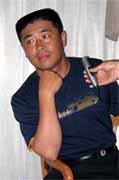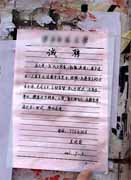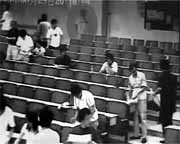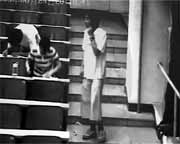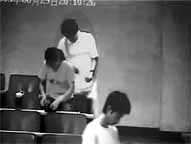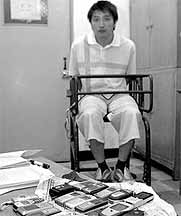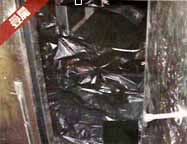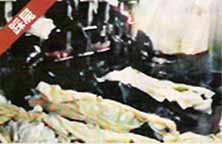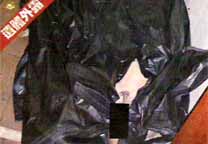2005 2004 Satisfied overall with the experience 89% 90% Will recommend friends and family to come 74% 95% Feel Hong Kong is more attractive than elsewhere 65% 92% Will come back to visit Hong Kong in the next two years 66% 89% Polluted environment in Hong Kong 39% 9% Poor level of putonghua spoken in Hong Kong 38% 11% Arrogance in Hong Kong people 29% 5% Poor cultural level among Hong Kong people 25% 4% Dishonest sales methods 25% 5% Congested traffic conditions 32% 17% Average amount spent HK$7,429 HK$10,400 It is noted that the universe between 2004 and 2005 are not the same, as solo travel rights were being opened up to more and more Chinese cities over time. Solo travelers from the newly opened cities will have a different profile from the pioneers.
The above is a survey, but here is the empirical report from a case study of one:(SCMP) Hongkongers pass the Putonghua hospitality test with flying colours. By May Chan. July 31, 2005.
The Sunday Morning Post took to the streets of Tsim Sha Tsui yesterday to see just how accommodating we are to our compatriots from across the border. With my fake mainland accent, I ventured out to talk to busy shopkeepers and pedestrians, and was surprised when I was greeted with kindness instead of rudeness. Once notorious for its snobbish attitudes towards mainland travellers, the city now seems more ready to cater for those from across the border.
"The orange one is made of crabmeat, and the yellowish one is fish," the fish-ball stall owner explained to me, in Putonghua, with a gentle voice despite his rough looks. "And the brownish one is spicy fish ball. No, we only accept cash. Thank you very much." And he did not scowl when I walked away without buying any of the goodies.
From the cosmetics saleswoman at Lane Crawford, I got a lecture on the close ties between Hong Kong and the mainland. "We are there to serve, so it does not matter what languages our clients speak," she said in broken Putonghua, which was as comical as my phony accent. "We have brushed up our [Putonghua] and learned to cater for your tastes. No Hong Kong person would be silly enough to turn away clients."
Walking away with my newly acquired knowledge, I approached a pair of unsuspecting young couples to ask for directions to the MTR. They were frustrated when I pretended not to understand their badly spoken Putonghua. In the end, they walked me to the MTR station. I could not help but feel a mix of guilt and heartfelt appreciation. "Which city do you come from, and why do you travel alone?" the boy asked me curiously. "A young woman should not travel on her own." I told him I was from Guangzhou, and I only intended to spend one day in Hong Kong. He was exasperated by my unsound travel plan. "If you only have one day in Hong Kong, you should have gone to The Peak instead of Tsim Sha Tsui," he scolded. "Go to Central and take the cable car to visit the Peak. I hope you have a nice time in Hong Kong."
I was touched by such sincere hospitality, which I seldom encounter as a local. Next time you get lost, try to speak in Putonghua. You just may get more help.
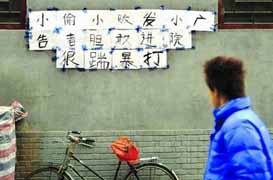
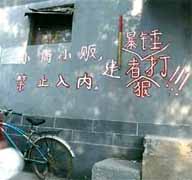
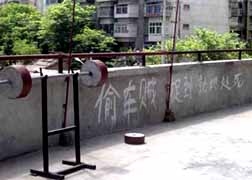

I've been listening to Sean [Hannity] and his comrades urging that law enforcement start profiling. They make a compelling argument. Why waste precious law enforcement time and resources when we know, WE KNOW, that the people we are after fit a specific profile? Just look at the pictures of people arrested and going to prison. DUH! Theyre all the same! Sure, those who are targeted might feel a bit hassled and it's unfair that they have to suffer for the crimes of a few. But they're Americans and it's their duty to put up with it.
Accordingly, I propose the IRS abandon its policy of random tax audits of all citizens (reinstated in 2002) and start targeting white males who live in the suburbs. That's where the big-bucks tax cheats are going to be found, not some secretary who lives in the Bronx. Give me the right to issue subpoenas for a Calibration Audit (i.e., each line is checked), both personal and any businesses they manage (this type knows no boundaries) and I'll give you enough money $$$ to properly equip every soldier in Iraq. In a time of war, to oppose profiling for tax law enforcement is tantamount to attacking our troops.
Add "they're Americans and it's their duty to put up with it."
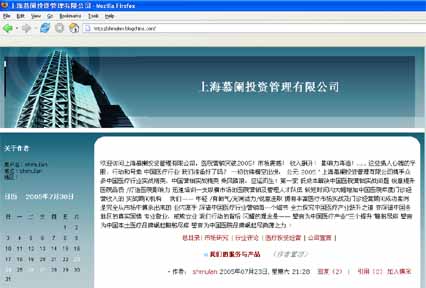


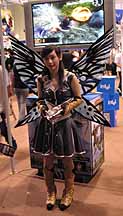



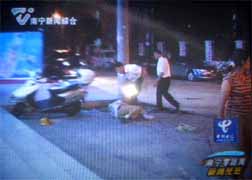

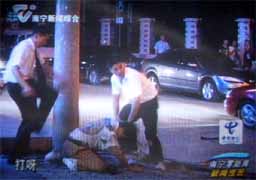
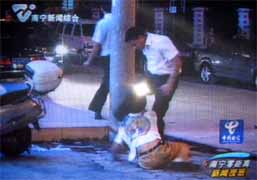
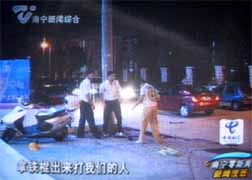
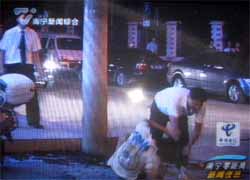
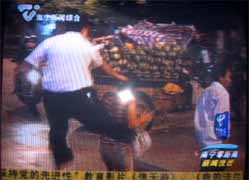
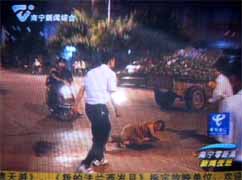
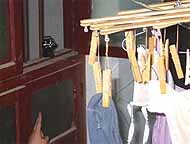
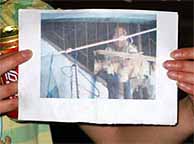
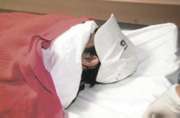







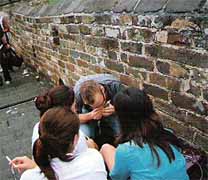
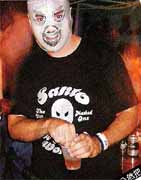


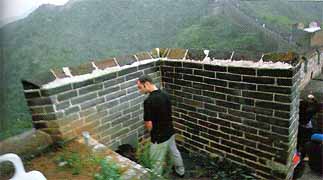

Year Democratic Party Democratic Alliance for Betterment Liberal Party Nobody 1996 22.0% 3.4% 3.6% 35.6% 1997 18.8% 2.7% 4.8% 34.3% 1998 23.6% 4.7% 4.2% 37.5% 1999 22.0% 6.8% 5.4% 36.9% 2000 20.4% 7.4% 3.0% 41.8% 2001 15.3% 12.7% 3.9% 44.2% 2002 9.9% 7.6% 4.9% 52.3% 2003 15.6% 4.3% 5.3% 53.3% 2004 19.2% 6.2% 7.8% 47.0% 2005 10.4% 7.2% 6.0% 58.8%
(in translation) At this year's Hong Kong Book Fair, there was a book whose popularity shocked all of us. That would be Wong Hui-lun's "Reading The Colonial Territory" (《閱讀殖民地》). Even the book's author had been convinced that this one will never sell well. In the foreword, he stated clearly that this was a work of self-indulgence. It would never please anyone, and it would guarantee that any other work of this author will never be looked by any reader. Yet at the book fair, I witnessed a number of people who are typically the Victoria Park uncle types who spend their time complaining about the British leftovers in the queue to purchase this particular book. This is really surprising because Wong Hui-lun's political position is clear to all of us: he was an assistant for the Democratic Party and he even donated money to "Long Hair"'s election campaign.
However, "Reading The Colonial Territory" contains a number of reproductions of certain original documents that have just been released from the British colonial era. Wong Hui-lun was able to describe how the Hong Kong British government used to run surveillance on leftist youth such as Cheng Hoi-chun, who is the Taipan at HSBC today. Wong also used the example of Fung Fei-fung about how the British colonial authorities oppressed a young leftist school teacher who went to get his education in mainland China. How could these solid evidence not rouse the passion of those who opposed the Hong Kong British colonial authorities back then?Around 1997, it was fashionable within the academic circle to talk about "post-colonialism." But the emphasis often seemed to be about the vague perceptions through Hong Kong movies or the indescribalbe experiences in Hong Kong literature. It was all about a Hong Kong culture squeezed between China and Great Britain, and between nationalism and ethnicity. But there was virtually nothing about the analysis of the political economy of the Hong Kong British colonial era. Even if there were, they did not enter the mainstream discourse, and they were much less impactful than the analyses of the young leftists of the 1970s.
Within mainstream society, people either think that the British colonialists were fantastic in everything that they did, or people hate the British for laying down a whole string of landmines to denotate after they left. "Reading the Colonial Territory" has the special virtue of jumping out beyond those two extreme viewpoints. It admits that the Hong Kong British colonialists were smart without praising them and it points out the cunning scheming of the colonial government without fanning natioanlistic fervor.
I don't know about you, but I am ready to go out and buy this book to read it.
(in translation) It is a pity that the work of an intellectual is like that in the myth of Sisyphus -- criticism is a neverending task. Lung Ying-tai quoted the Czech writer Ivan Klima on the explanation of power: when there is a struggle, it is usually not a struggle between good and evil. Instead, it is a struggle between evil and another form of evil. Whoever seizes the power becomes the spokesperson for evil. Twenty years later today, the former political 'evil' has been washed away by the tide of history. We can only pose as if to set fire, but there is apparently nothing to set fire to. But Lung Ying-tai reminded us that after the struggle between evil and evil, evil will not just vanish. Instead, it will become even more powerful, multi-faceted, omnipresent and much more difficult to expose. Intellectuals need even greater wisdom and moral courage in order to discharge their responsibilities as intellectuals of this age. In re-reading The Wild Fire Collection, the greatest revelation for me is this: Intellectuals today know how to pose as if to set fire, but they have little ability to discern what needs to be set fire to.

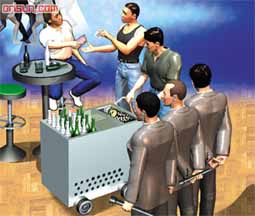
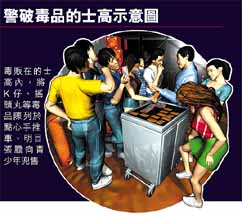

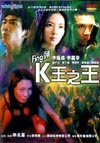
Zhang Ziyi: Pathetic on the airplane. She was haughty and contemptuous. She sat with her assistant in first-class. When the plane was about to land, the worker asked her to help to raise the window blind (her assistant had the window seat and he was asleep), but she said: "You can speak to him yourself!" Heavens! Did she think that the worker was trying to speak to her? Does she think that she is such hot stuff? Well, maybe she could do that if she were Maggie Cheung. Surprisingly, her physical attributes are as bad as her acting skills -- small breasts, big ass, small legs, narrow waist, full of black spots on the face.
Richie Jen: Very polite. When you bring him food, he thanks you. He always smiles. Even when he refuses to sign his autograph, he still smiles.
Chen Tingwei: Really insufferable! He comes up and grab your hand without letting go. Then he takes out a promotion booklet and says, "I'm Chen Tingwei ..." You'll pass out ...!
Tao Zhe: He was going to Los Angeles. When the workers had to deal with him, he always kept saying "Thank you" and "Sorry to trouble you". For a popular artist to be so polite must mean that he had good upbringing. As we were about to land, I was doing the safety check. A little old lady in the first row had opened up the overhead compartment, took out a large suitbase and placed it in front of her feet. I explained to her that this was an emergency exit pathway and no luggage must be placed there. She said, "The suitcase is heavy. I don't want to take it back up again." I explained again that this may affect an emergency escape. She said, "In that case, you can put it back up." So I sighed and I lifted the suitcase up to my chest. But I could not lift it any further up. It was so heavy! Did she put marble stones in there? The old lady looked at me as if saying, "You asked for it!" But someone in the fourth and last row unhooked his seatbelt and got up to lift the suitcase with me. Yes! It was Tao Zhe! When I spoke to other workers about this, I found out that he was always friendly and polite. He was the most unforgettable star in my eight years of flying ...
Zhang Xinzhe: He snores when he sleeps. Quite loud.
Jordan Chan: The most disgraceful artist that I have ever seen! You would know as soon as you saw him! Like a street thug. He got on and threw his legs up so that no one can get pass or sit down! Like a street bum! He would yell at the service workers without any manners. When the airplane stoped, he was yelling at a stewardess in Cantonese. I couldn't understand but I knew he was cursing her. We were sorry that we ever watched any movies by this little hoodlum. People like that can only become popular in the cultural desert of Hong Kong.
Gigi Leung: The artist most hated by airline service workers. A service worker wanted a photograph taken with her, and Gigi agreed and even asked for a copy to be sent to her. The worker was obviously happy to oblige. A few days later, the worker was told to see the manager, who said that Gigi Leung had complained about being disturbed during the flight. What hypocrisy!
I cannot tell you how much of this is truth or malicious slander. But I will tell you that all the previous postings about the outpouring of love for Lin Chiling is due to less to her physical beauty than her consistent personal demeanor towards the media and the citizenry. Moral of the lesson: Try to be nice on each and every occasion and it really isn't that difficult -- the world would be a much better place if everybody does that! P.S. On my last trip, Cathay Pacific asked me to fill out a questionnaire. You will have to trust me if the service workers were asked to rate me, they would have given a perfect score. But, as I said, it really isn't that hard.

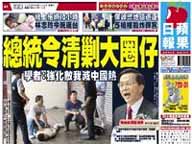
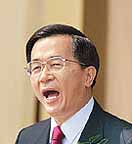
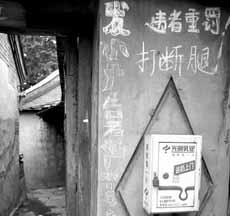
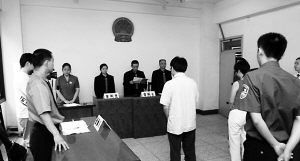
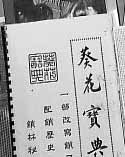



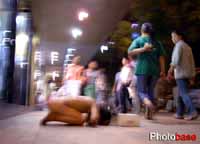
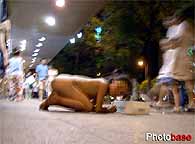
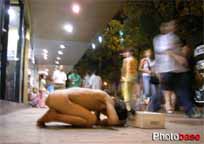
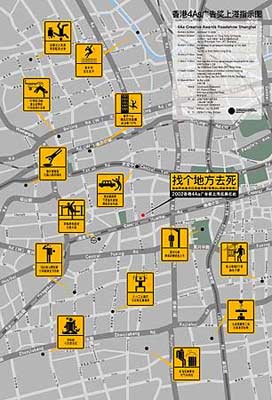
- Duke of Aberdeen noted that Swedish-originated Metro has raked in profits of HK$20-30 million precisely because it is apolitical, whereas Headline News will not be able to refrain from meddling in politics due to its parentage (the Sing Tao group).
- Florence Lai (Over the Rainbow) discussed about how the human resources for Headline News were allocated. Mostly, they will be Sing Tao people helping out on a temporary basis.
- Florence Lai (Over the Rainbow) is a reporter by profession, and she compared the two free newspapers according to reporting styles with illustrative examples. She offered the example of the decision to stop live horserace broadcasts at Radio Hong Kong, which is an objective fact. However, a traditional journalist cannot offer his/her own opinion on this decision because that would be subjective. Instead, he/she needs to speak to other parties to elicit their opinions. This is interesting because surely the decision of which third parties to talk to must be subjective as well.
- Miss Lee in Summer provided a common reader's viewpoint, and she is definitely not happy about the aggravation. She concluded: "This is a free society and commerce operates freely. You can publish whatever you want to, and I can refuse to read whatever I don't want to."These are interesting blog comments, but they seemed to be only scratching the surface. As a reader, I personally don't find the summaries terribly interesting and I would need to follow through on the links. But a non-Chinese-reading reader will not be able to follow through with those links. Somehow, my sense is that if one is really interested in the subject, this English-language blogpost at Dustless Workshop is superior to the reading of the bridge blogger's summary. Instead of bridge blogging, I would have done an English-language blog post instead to articulate my own and as well as other viewpoints in completeness and fairness.
As an individual person, I think that the more interesting blog post would be about my meeting with the Metro management in Santiago de Chile in which they explained their business model and distribution strategy to me. And I can also tell you more than two or three things about the readership characteristics of free vs. paid newspapers that may affect their survivability.
So how shall I spend my time? Bridge blogging? Blogging for myself? Or consultancy for money? Hmmm ... is there even a choice?
P.S. Dustless Workship: In reply to EastSouthWestNorth...plus some thoughts... "I personally found that very interesting, and should ESWN decided to write about the two topics he outlined, I will certainly be the first one to read them." Alas, that will not happen as discussion of the first topic implies betrayal of trust while the second topic involves commercial interests.
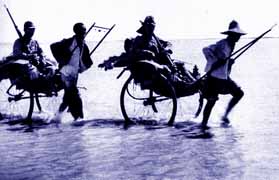

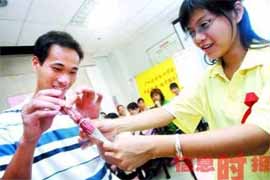




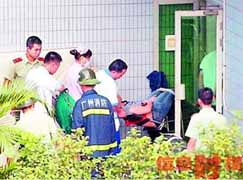
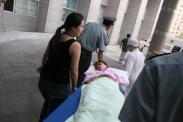



A post like "Let's hold multiparty elections" is deleted before posting or soon after. But more crucial is the party's channeling of chat-room discussions to serve its own interests. The pattern began in 1999, when an American B-2 bomber dropped five 2,000-pound bombs on the Chinese Embassy in Belgrade. State-run media immediately used the Internet to suggest that the bombing was no mistake. As anti-American riots erupted, the People's Daily, China's largest Communist Party-owned newspaper, created a Web chat forum to denounce the bombing. Thanks to these efforts, today an astonishing number of Chinese still believe that the bombing was a deliberate attack, and chat-room-fired protests against the United States or Japan are a regular fixture. When China captured a U.S. spy plane in 2001, the government encouraged posts like, "If little Bush goes on squawking, we should rope together his 24 white pigs and parade them through the streets."
Here are the closing paragraphs of the Body and Soul blog post:
This is intriguing not just for what it says about the limitations of free speech in China, but also because of its insight into how political conversation works in this country. Outrage of Newsweek's uncrossed t's and undotted i's in the Koran desecration story sweeps real revelations about torture under the mat. Spitting and sputtering about Eason Jordan makes it harder to be taken seriously when you talk about the clear evidence of targeting at least some media workers. And it's not only in the press, but also in blog posts, which can be nearly as bad as the corporate media when it comes to jumping on the latest hot story.
Blogs increase free speech. They amplify small voices. But at the same time, they increase the ability of intellectual bullies to shove the conversation in directions they want it to go. Is free speech on the internet, whether in China or anywhere else, something of an illusion?

The occasion was a public apology (and donation to the Arizona Burn Center's Foundation for Burns and Trauma) after American Media Inc.'s Weekly World News named Phoenix police officer Jason Schechterle (who was tragically burned and disfigured four years ago when a taxicab rammed into his patrol car, which burst into flames) one of the 10 ugliest people in the world.
There are a great many adjectives that come to mind for the kind of journalism practiced by a publication (or company) which could dream up such a bottom-feeding idea as a list of the 10 ugliest people in the world, but "quality" isn't one of them. And it doesn't matter who got fired, or how quickly they pulled the issues off the newsstands, the fact that it was considered a viable story idea in the first place is nearly as repugnant as featuring the likeness of a police officer disfigured in the line of duty. And one can never be sure the donation and apology weren't the most expeditious ways of avoiding what was sure to be a breath-taking lawsuit.
You can't help but think that H. L. Mencken's "No one ever went broke under-estimating the taste of the American public" is somewhere painted on the entrance way of American Media's newly relocated headquarters.
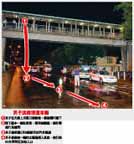
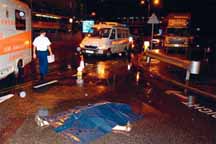
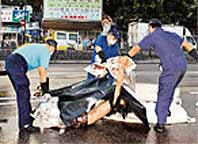





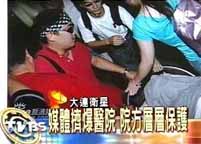

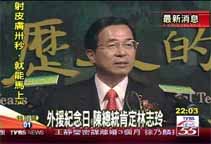




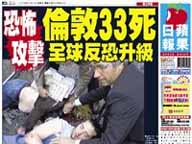




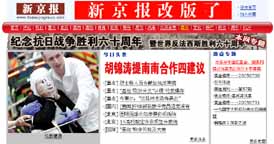
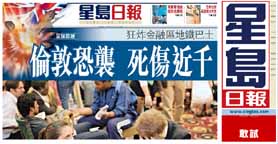
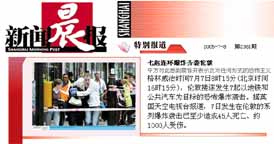
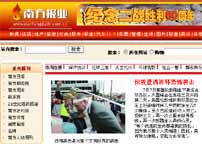
There is a large sign with the word 'Injustice' (冤) in black-on-white background. In the courtyard, there were six mourning altars lined with flower wreaths for the six dead villagers. The banner across the center read: "In order to carry out the land policy of the central government and to protect the interests of the villagers, they gave up their precious lives." ... The villagers said that the cadres have disappeared since the incident: "They are not cadres from our village. We hadn't elected them!" The office of the village cadres has been turned into a mortuary, with flies everywhere inside. ... By the time that we were allowed to leave, the final words from the local officials to us were: "If the National News Office did not call us and your station director had not come today to fetch you, you couldn't have left here this way."
P.S. I have added just added photographs from another blog to corroborate the Phoenix Weekend story.


